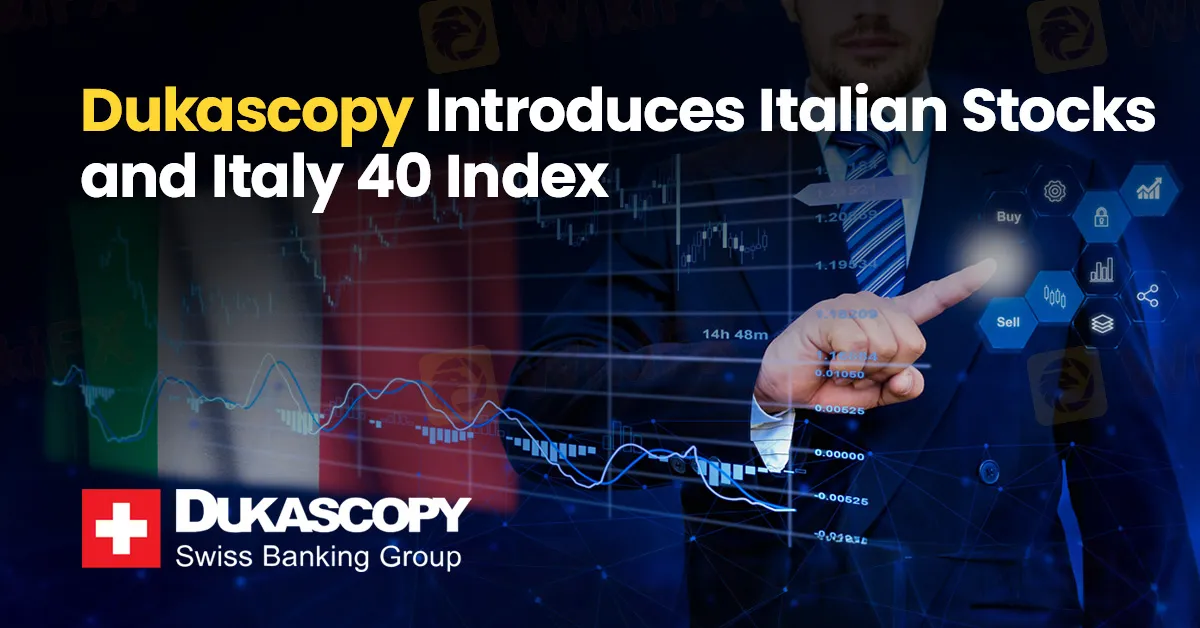简体中文
繁體中文
English
Pусский
日本語
ภาษาไทย
Tiếng Việt
Bahasa Indonesia
Español
हिन्दी
Filippiiniläinen
Français
Deutsch
Português
Türkçe
한국어
العربية
Dukascopy Introduces Italian Stocks and Italy 40 Index
Abstract:Dukascopy, a Swiss forex broker, has broadened its offerings to include Italian stocks and the Italy 40 Index, providing clients with an expanded array of investment opportunities in the Italian market.

Dukascopy, a Swiss forex broker, has broadened its offerings to include Italian stocks and the Italy 40 Index, providing clients with an expanded array of investment opportunities in the Italian market.
The latest additions feature stocks from prominent Italian companies such as Enel Spa, Ferrari NV, and Fiat Chrysler. Clients can also trade the Italy 40 Index, which tracks the top 40 companies listed on the Borsa Italiana. This index offers a comprehensive view of the Italian stock market, covering diverse sectors like banking, fashion, and automotive.

Dukascopy advises clients to consider the Italian Financial Transaction Tax (IFTT) on derivatives based on Italian shares and indices. This tax is a significant factor for those trading Italian assets and should be included in their trading strategies.
In a recent blog post, Dukascopy highlighted the rising client interest in Contracts for Difference (CFDs). This move aligns with the broader industry trend of brokers expanding into multi-asset trading by enhancing their CFD portfolios, and Dukascopy is strategically positioning itself to meet this demand.
Dukascopy's primary goal with this expansion is to address the evolving trading needs of its clients. Both new and seasoned traders have shown a preference for a multi-asset, single-margin account, which this new offering supports.
The inclusion of CFDs is anticipated to bring immediate advantages to Dukascopy, leveraging the increasing popularity of this instrument among clients and the overall maturation of the CFD market.
Over the past six years, Dukascopy has significantly invested in diversifying its product range. Beyond its core forex trading services, the bank has developed infrastructure for cryptocurrency issuance, custody, and exchange, as well as retail mobile banking features such as instant payments and card operations.
The Dukascopy Group, which includes banks and securities houses, operates under the regulatory frameworks of Switzerland, Latvia, and Japan. The group offers a wide array of products, including foreign exchange, precious metals, CFDs, and binary options, available through both desktop and mobile trading platforms. Their financial services portfolio also includes current accounts, guarantees, traditional banking payments, instant smartphone payments, and payment cards.

Disclaimer:
The views in this article only represent the author's personal views, and do not constitute investment advice on this platform. This platform does not guarantee the accuracy, completeness and timeliness of the information in the article, and will not be liable for any loss caused by the use of or reliance on the information in the article.
Read more

The Hidden Checklist: Five Unconventional Steps to Vet Your Broker
Forex broker scams continue to evolve, employing new tactics to appear credible and mislead unsuspecting traders. Identifying these fraudulent schemes requires vigilance and strategies beyond the usual advice. Here are five effective methods to help traders assess the legitimacy of a forex broker and avoid potential pitfalls.

Doo Financial Obtains Licenses in BVI and Cayman Islands
Doo Financial, a subsidiary of Singapore-based Doo Group, has expanded its regulatory footprint by securing new offshore licenses from the British Virgin Islands Financial Services Commission (BVI FSC) and the Cayman Islands Monetary Authority (CIMA).

CFI’s New Initiative Aims to Promote Transparency in Trading
A new programme has been launched by CFI to address the growing need for transparency and awareness in online trading. Named “Trading Transparency+: Empowering Awareness and Clarity in Trading,” the initiative seeks to combat misinformation and equip individuals with resources to evaluate whether trading aligns with their financial goals and circumstances.

Malaysian-Thai Fraud Syndicate Dismantled, Millions in Losses Reported
The Royal Malaysia Police (PDRM) has received 26 reports concerning the Nicshare and CommonApps investment schemes, both linked to a major fraudulent syndicate led by a Malaysian citizen. The syndicate’s activities came to light following the arrest of its leader by Thai authorities on 16 December.
WikiFX Broker
Latest News
ASIC Sues Binance Australia Derivatives for Misclassifying Retail Clients
WikiFX Review: Is FxPro Reliable?
Malaysian-Thai Fraud Syndicate Dismantled, Millions in Losses Reported
Trading frauds topped the list of scams in India- Report Reveals
AIMS Broker Review
The Hidden Checklist: Five Unconventional Steps to Vet Your Broker
YAMARKETS' Jingle Bells Christmas Offer!
WikiFX Review: Something You Need to Know About Markets4you
Revolut Leads UK Neobanks in the Digital Banking Revolution
Fusion Markets: Safe Choice or Scam to Avoid?
Currency Calculator


